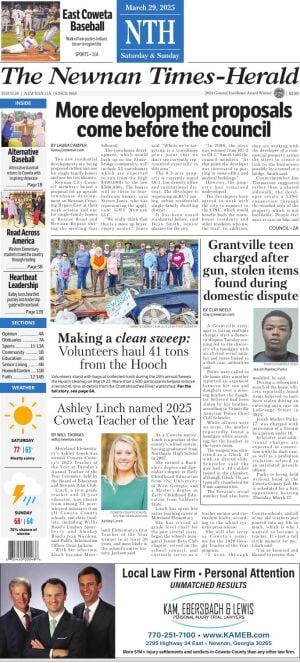A routine test during pregnancy alerted doctors that Deunta “Dee” Torbert, then 34, might have kidney issues.
“I had protein in my urine,” Torbert said.
It was the first marker for kidney disease she showed, Torbert said.
Her doctor sent her to the University of Alabama at Birmingham hospital for further testing that confirmed kidney disease, and she ended up staying for a month until she delivered her son.
But it wasn’t until about four years later that she started experiencing the symptoms of kidney disease, and they seemed to come on all at once, she said.
“I could barely make it up the stairs,” Torbert said. “I was just tired all the time.”
Still she said it was “like a punch in the gut” when they told her it was time to start dialysis.
“Now I have to (integrate) dialysis into my lifestyle,” Torbert said.
Currently, she does daily dialysis for about 11 hours at home, she said. Torbert is waiting for a kidney transplant. She’s on the transplant list both at UAB and at Piedmont Atlanta.
“It’s just a matter of time,” Torbert said.
While she waits, she’s started a nonprofit to raise awareness of kidney disease and how to keep your kidneys healthy. Kidney Health and Wellness Foundation uses the money it raises to inform the public of the importance of kidney health, Torbert said.
Don’t take kidneys for granted
“Kidney disease is literally silent, which means the patient is essentially unaware that they even have it,” said Dr. Vishal Ratkalkar. “That is a flaw in our design.”
If a person has heart disease and loses 30 to 40 percent of their heart’s function, they will have symptoms. If they lose function of part of their lung, they will have symptoms.
“If you lose 50 percent of your kidneys’ function, you have absolutely no symptoms,” he said. “That is the biggest danger.”
While kidney disease can go unnoticed, there are simple blood tests done during annual physicals that can detect problems before they get past the point of treatment. So seeing a doctor annually can go a long way to slowing or preventing kidney disease, he said.
March is National Kidney Month, a scheduled time to raise awareness of kidney disease. It’s common. About one in seven adults in the U.S., or about 35.5 million people, are affected by kidney disease, according to the Centers for Disease Control and Prevention. But it’s something that the public isn’t educated about enough, Ratkalkar said.
The lifestyle effect
Ratkalkar has been working as a nephrologist in Georgia since 2012 and in Newnan since 2015. He’s seen that lifestyle and habits can have a huge impact on the kidneys.
For instance, in this area, he’s noticed kidney stones are common. The stones are not a sign of kidney disease, but they are a risk factor.
“People don’t drink enough and if they do drink, they choose iced tea and carbonated drinks and other drinks as opposed to water,” Ratkalkar said. “More than 75 percent of our body is water, so your body just needs water.”
People need to drink about 64 ounces of water daily on a regular basis, he said.
Ratkalkar added that the foods people choose also affect the kidneys. Processed meats including hot dogs, sausages and precooked meats such as those used by many fast food restaurants are high in inorganic phosphorus and acid content that can damage the kidneys, he said.
“Kidney friendly diets are more plant-based diets,” Ratkalkar said. “Using red meat more as a treat (for) yourself occasionally rather than making it a mainstay of your every meal is important.”
Ratkalkar also cautioned people about nonsteroidal anti-inflammatory drugs including ibuprofen, naproxen and ketoprofen. He added that Tylenol is not one of the dangerous NSAIDs.
“There’s no black box warning,” he said. “It’s not advertised. It’s not known to the public. If you can buy it, they think it’s safe.”
But studies have shown that even aspirin, which the public sees as harmless, can cause damage to the kidneys, Ratkalkar said. Although daily aspirin used to be commonly suggested for people, that’s no longer the recommendation.
“If you have stents, if you have major coronary artery disease, then yes,” he said. “But aspirin on a daily basis if you ask now, no longer the recommendation.”
There are so many therapeutic options and medicines that are good for one part of the body, but may hurt the kidneys, Ratkalkar said.
“I feel that I’m the doctor’s doctor in the sense that whatever someone else does, we have to kind of correct the course,” he said.
Risk factors for kidney disease
Kidney disease is more common in older adults simply because the kidneys age just like the rest of the body, Ratkalkar said.
But he said it’s also more common among African Americans and until recently, no one was sure why. Recently, doctors discovered a genetic mutation, apol1, that offers some explanation for the disproportionate risk of African Americans to develop kidney disease.
The mutation seems to have developed as a protection against sleeping sickness which is transmitted by the tsetse fly in the sub African, sub Saharan area. But it also causes problems for the kidneys.
Polycystic kidney disease, characterized by cysts that form in the kidney, is another genetic cause, he said.
But the number one cause of kidney disease is diabetes, Ratkalkar said.
Untreated diabetes and high blood pressure is what Torbert believes caused her kidney disease, she said. And it’s why she believes it’s important to educate the public about kidney disease and kidney health.
“I want to share awareness to try to prevent people from getting in this situation,” Torbert said.
Kidney disease is highly treatable if caught early, Ratkalkar said. In that sense he feels privileged to be a doctor in the field. If the patient is willing to do the work, he can help them stay healthy.
“I, as a doctor, can stand behind my patient and say, ‘I’ve got your back,’” he said.
And that’s why Torbert believes it’s important to educate the public about kidney disease and kidney health, she said.








